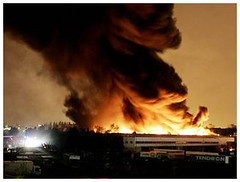Fait Accompli

Western Europe is in a crisis. Fifty years of multiculturalist policies that kept Muslims segregated on social welfare roles will be the ink that writes the next chapter of European history.
On my side of the Atlantic, there's little to relish in this crisis. Losing Old Europe is tragic. Many rich continental cultures are ebbing, having lost faith in themselves. And Europe is on the vanguard in the war against terrorist fascism. Watching the fires of France, I wonder if we are seeing a tragic axiom play itself out: As Europe goes, so goes the West. Europe is our first line of defense, whether we like it or not. For now, Dominique de Villepin is the front-line general in this global war. Not encouraging. And perhaps if he fails soundly, the pounding fist of Jean-Marie Le Penn will take up the sword.
France's reaction to the unrest in its cites -- amounting to more methadone for the addicts -- has lead me to conclude that social democracy cannot fundamentally tackle militant Islamicism. It just can't. Social democracy provides too many loopholes and gotchas for the Islamicists who have no patriotic allegiance to their European hosts. Extreme Euro-egalitarianism allows the very enemies of egalitarianism to borrow time, dig trenches, tie-up courts with litigation about t-crossing and i-dotting, achieve light sentences, receive public funding and a political framework to advance fundamentalism. From my perspective, Islamic fascism and social democracy are temporarily symbiotic. But the long view of their symbiosis is that social democracy is a tool of the Islamicist's arsenal, not visa versa. The symbiosis of fundamentalism and social democracy is not mutualistic or commensalistic; instead, it's parasitic, at the expense of a deferential, accommodating host.
It's uncomfortable for me to conjure up metaphors of the European malaise that sound like cancer. The Nazis did that. Seeing a subculture as cancerous is a major step into the abyss, giving the green light for unspeakable policies that are anti-liberal in the extreme. I am very sensitive to identifying groups of people as parasitic. It scares me. And yet, is the analogy accurate on some level? I'm really asking.
Multiculturalists overlooked a major flaw in their rationalist creed: the world is not only composed of many cultures, but also a handful of civilizations, of which cultures are a subset. The strife in France's cites are less about chafing cultures than it is about the age old divide between Islamic and Christian civilizations. I really doubt that multicivilization is a remotely workable concept. Multiculturalism can only work under the roof of one civilization. This war is not between cultures; it's between civilizations. It's not about i-dotting and t-crossing in a multicultural court; it's about Sharia versus liberal democracy. There's a choice at hand, and there's really no complacent, pacifist middle ground to mix oil and water. They will not mix.
We've benefitted for years from a pacifist Europe. And now we want them to take up the sword -- or at least get some of that old time nationalism to help thwart this wave. But that comes at a price -- one that most Europeans are quite aware of, if we aren't. European wrath is legendary. It's not dead -- it's asleep. I appreciate their penchant for glossing it over. Europeans know what wrath they have wrought throughout history. They want to escape it. I can't blame them.
Is America immune from malaise? No. We have our own multicultural leanings. Our country is less integrated than it used to be. At best, multiculturalism celebrates cultural differences; at worst, it isolates cultures as a disincentive for integration. The beauty of Americanism is that cultures are melted together. Multiculturalism in America is changing the melting pot into a tossed salad.
Is America immune from strife? Certainly not. I recognize that some of the rioters of Europe are not just Muslim, but are also the dispossessed. Many appear to be the dispirited, soulless youth that Western pop-culture grooms so well. Our culture can be possessed of the same soullessness at times -- it depends on where one looks. But the malaise is here, too, although civilization's divide is not as acute in North America as it is in Europe. Things are still comparatively fresh here, but that is only a matter of degrees. Strife can leap out unexpectedly.
There are of course cell phones and anonymous websites that give the European riots the whiff of conspiracy. The technological miracles of our time bleed civilizations into each other, in more ways every day. And as such, it isn't even all about Muslims and liberals; there's an inexorable, simultaneous pulling apart and coming together created by all this technology. Some hope it will bring humankind together; others think it deepens the divide between us. In either case, it's a question of civilization, and whether or not there's room on this shrinking planet for more than one.
A couple of years ago Michael Totten recounted something a friend told him about Europe:
I have an American friend who lives in Belgium, and he recently came by for a visit. I asked him why he thinks Europe is becoming such a dark place all of a sudden, and I must admit I wasn't prepared for his answer.I've never forgotten that view of Europe. The last 40 years or so Europeans have adeptly projected an image of a new, revitalized Europe -- a global center for true equality, fairness and prosperity. That's what the brochure says.
He said Europe has always been a dark place and it hasn't changed at all.
But Europe has always been a dark continent -- in spite of its beautiful empty cathedrals, art, food, culture and pretensions of greatness. The continent's somber history might be its fait accompli. Our fate hangs in the balance.

<< Home